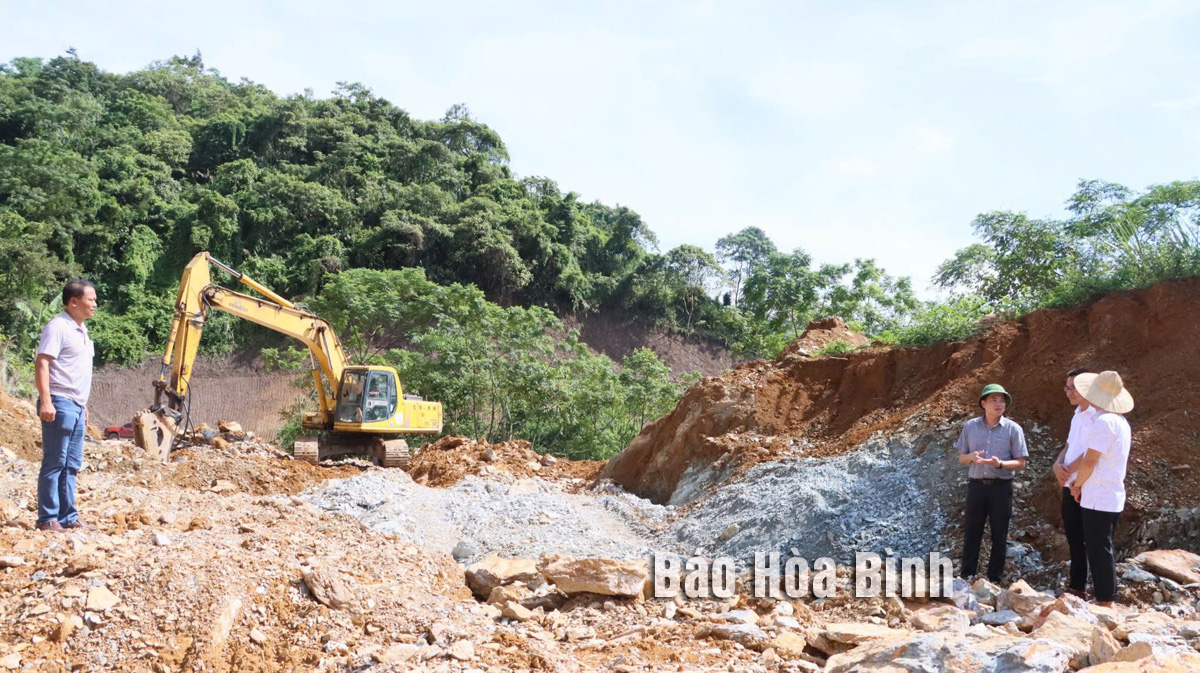
Luong Son district in Hoa Binh province is taking a proactive, community-driven approach to implementing Vietnam’s national target programme for socio-economic development in ethnic and mountainous areas (2021–2025), known as Programme 1719.

Luong Son district leaders inspect construction progress on the Suoi Ben–Chi
Ngoai road connecting Lien Son commune and Hung Son commune (Kim Boi district).
Rather
than simply waiting for funding to be disbursed, the district has adopted a
development strategy focusing on building trust, improving infrastructure, and
harnessing local capacity. This model goes beyond poverty reduction, it
reflects a broader ambition to create sustainable and self-reliant growth.
Community
involvement builds trust
Luong
Son has actively involved local people in every stage of project
implementation. From selecting infrastructure projects to overseeing
construction and usage, ethnic minority communities are no longer passive
beneficiaries, they are equal stakeholders. In some cases, residents have
contributed hundreds of millions of dong to build community centres, despite
facing economic hardship.
This
participatory and transparent process has fostered trust between the government
and the people. The district’s poverty rate dropped from 2.82% in 2021 to just
0.85% in 2025 - a clear indicator of both progress and changing mindsets.
Targeted
infrastructure boosts opportunity
In
remote areas where physical distance often equals limited opportunity,
infrastructure is not just about roads or electricity, but a tool for
development. Luong Son has prioritised investment in projects that resolve
specific bottlenecks.
Key
initiatives include the Suoi Ben–Chi Ngoai inter-commune road (Lien Son and
Hung Son communes) with funding exceeding 21 billion VND (840,000USD),
and a clean water supply system in Yen Lich village, Thanh Son commune, backed
by 3 billion VND from the central budget.
All
community houses built under Programme 1719 were sourced from central funds,
district budget and community contributions. This approach strengthens both
technical quality and community trust.
Empowering locals to drive change.
From
2022 to 2024, Luong Son ran 60 vocational training courses for over 1,100
ethnic residents. The courses on vegetable farming and poultry raising,
weaving, cooking, and electrical work, focused on practical, income-generating
skills.
Several
livelihood models have emerged and expanded, including goat farming and
medicinal herb cultivation. New cooperatives now grow grapefruit, tea, and
guava, helping preserve natural resources while creating jobs.
Bui
Thi Xuyen from Cao Son commune turned wild forest vegetables into a commercial
success. Xuyen said she grows clean produce at home, earns a stable income,
and has encouraged other women to join, seeing poverty reduction as a real,
achievable goal.
Each locality must chart
its own path to sustainable growth. Luong Son’s "development triangle” of
trust, infrastructure, and human capital offers a potential model for other
ethnic areas pursuing lasting, community-led progress.
Hoa Binh province has made notable progress in public administration reform and digital government development, with the satisfaction index among citizens and businesses reaching over 84%, according to recent government evaluations.
Thanks to great efforts by local authorities in recent times, the governance and public administration performance of Mai Chau district has been significantly improved.
In the afternoon of June 6, the Party Committee, the People's Council, the People's Committee and the Fatherland Front of Lac Son district solemnly held a meeting to celebrate the 139th anniversary of the district's founding (1886–2025) and the 79th anniversary of the establishment of the district's Party Committee (1946–2025). There was the attendance of Mr. Bui Van Thang, the Vice Chairman of the Provincial People's Council; Mr. Quach Tat Liem, the Vice Chairman of the Provincial People's Committee; Ms. Dang Bich Ngoc, the Deputy Head of the National Assembly Delegation of the province; as well as the former leaders of the province and district through various periods, who are the natives of the district.
Implementing the Politburo’s Resolution No. 57-NQ/TW on breakthroughs in science – technology, innovation, and digital transformation is a golden opportunity for the northern mountainous province of Hoa Binh to renew growth model, improve competitive edge and shorten digital gap.
Resolution 57-NQ/TW, issued by the Politburo on December 22, 2024, identifies sci-tech, innovation, and digital transformation as strategic breakthroughs to build a developed and prosperous nation. In Hoa Binh province, this spirit is not just a slogan, it’s being put into action through concrete initiatives that form a "new development triangle”: digital citizenship, digital economy, and digital administration.
Hoa Binh province is undergoing a dynamic transformation amid Vietnam’s national digital transition. Building on Poliburo’s Resolution No. 57-NQ/TW on breakthroughs in science, technology, innovation, and national digital transformation, the province has rolled out a wide range of practical action plans. A standout initiative is the "Digital Literacy for All” movement, an effort to ensure that no one is left behind in the digital era.



